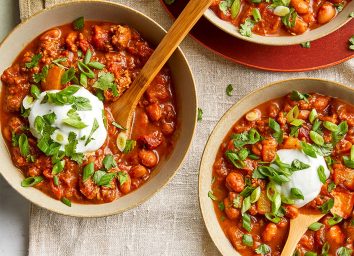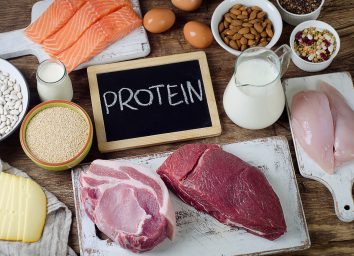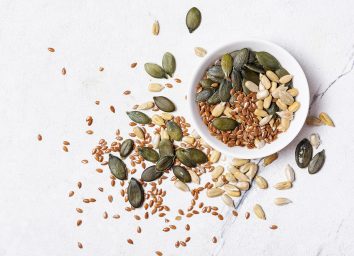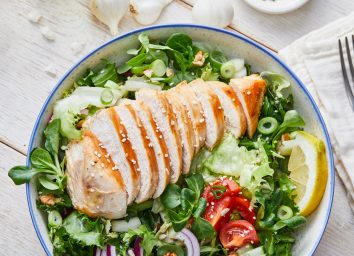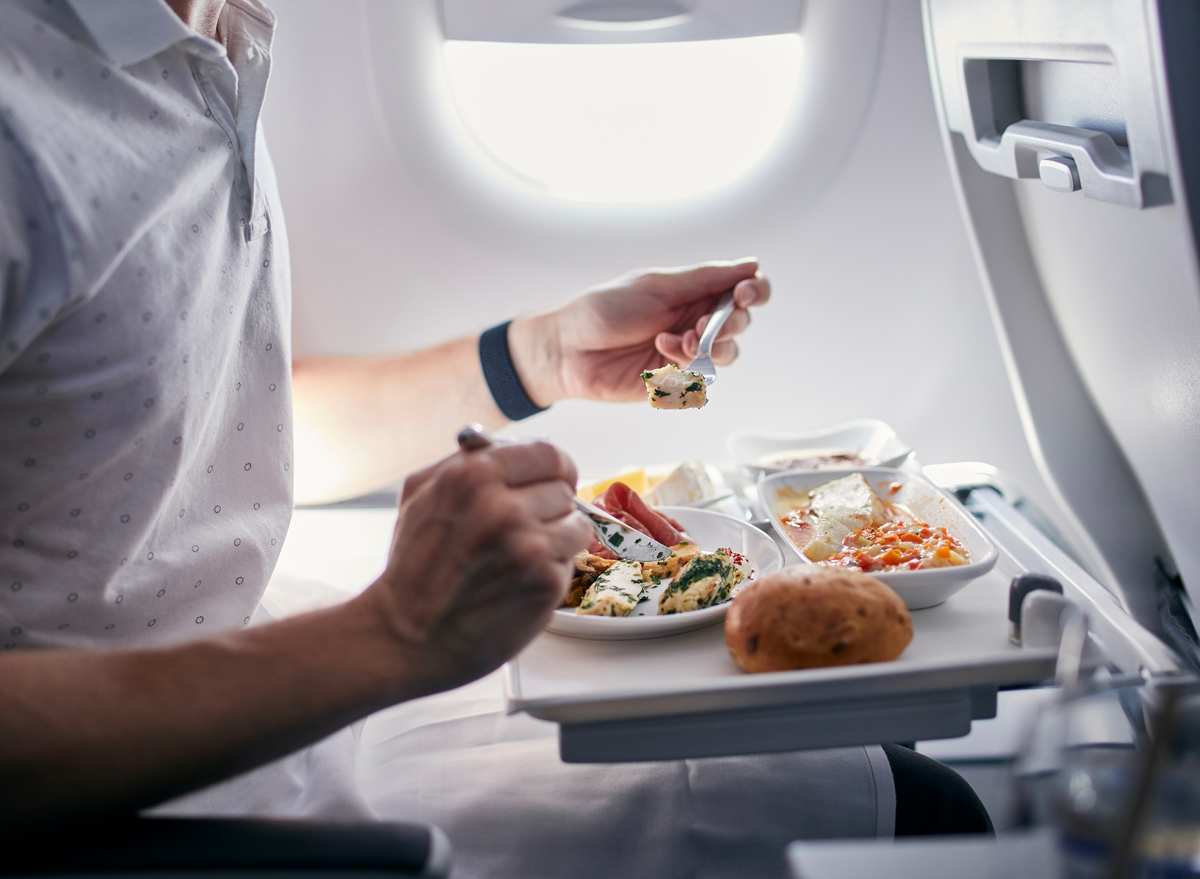
'Tis the season to be jolly, and what better way to spread holiday cheer than by hopping on a plane to visit your loved ones or by traveling to an exciting new place? While our minds are often preoccupied with thoughts of long security lines, rushing to make it to your gate in time, or airport parking logistics, there is one thing that deserves more of your attention before you fly: your food choices.
That's because what you consume before boarding can significantly influence your in-flight experience. And sometimes that's for the worse. We're talking about dealing with the discomfort of bloating, excess gas, or an urgent need for the restroom at 30,000 feet above ground—not an ideal scenario for holiday travel.
We may not be able to control the turbulence you encounter, but one of the ways we'd like to help your flight go as smoothly as possible is by shedding light on how certain food and drink choices can lead to physical discomfort mid-flight. So, fasten your seatbelts, and join us as we navigate the foods and drinks that science says are ones to skip before your next flight. Then for more helpful holiday tips, check out the 5 Holiday Foods a Cardiologist Avoids.
Fried food
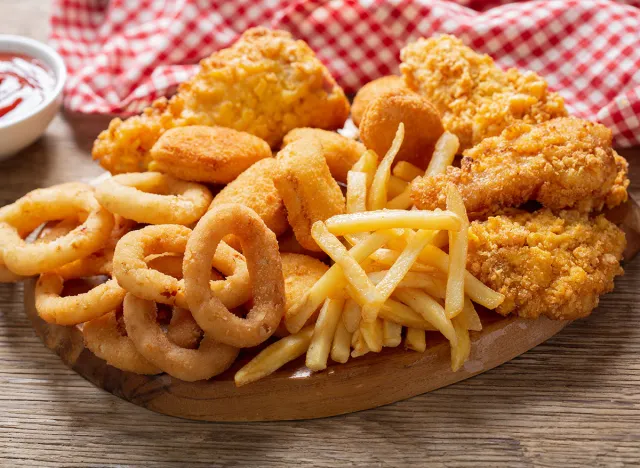
If you're killing time at the airport and looking for an inexpensive lunch or dinner before your flight, it can be tempting to grab a plateful of chicken fingers and fries. However, there are a few reasons you may want to reconsider!
For starters, greasy foods contain high levels of fat, and high-fat foods take much longer to digest than protein and carbohydrates. If your fries, chicken fingers, and onion rings sit in your stomach for a long time, it will more than likely lead to bloating and a possible upset stomach.
It is already uncomfortable enough to have to sit on a long flight with a bloated and upset stomach, but because high-fat foods sit in the stomach longer, they can lead to heartburn or intense acid reflux in people who are more prone to these symptoms. Now that sounds like a stressful flight.
High-sodium foods
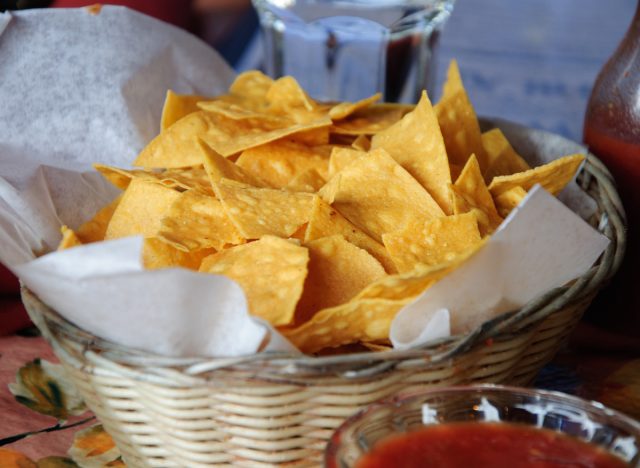
Maybe you're scarfing down a beer with some chips and salsa before your flight, or perhaps you grabbed a bag of potato chips to tide you over until you make it to your destination. Even though snacking on something savory can be satisfying before you travel, be careful with how much sodium you take in before you hop on the plane.
Because of changes in pressure and lower humidity environments inside the plane, you are likely to experience some level of dehydration when flying, and unfortunately, high-sodium foods can also dehydrate you, which makes for a not-so-great combination.
Flying can also cause your body to retain more water because of pressure changes and sitting for too long, and high levels of sodium can have this effect too.
You're better off leaving the super salty foods behind to avoid as much discomfort as possible.
Broccoli
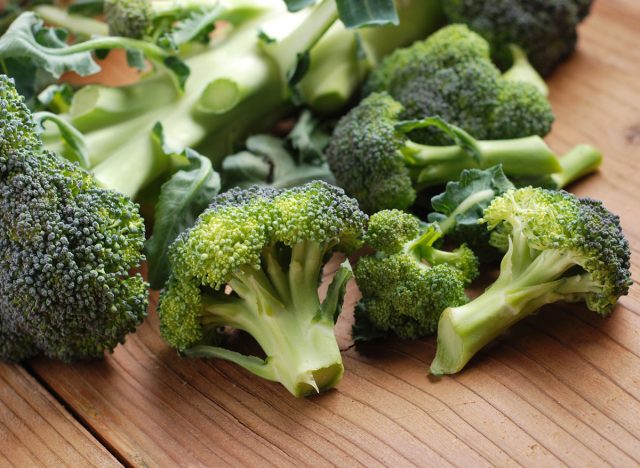
Cruciferous vegetables like broccoli, kale, cabbage, cauliflower, etc., are some of the healthiest foods you can eat. They're high in antioxidants and necessary vitamins, and they're extremely high in fiber compared to many other vegetables.
While this is a great thing for your health overall, you may want to skip out on the side of broccoli when you're ordering your airport meal. Cruciferous vegetables are so high in fiber, that they can cause bloating and excess gas.
Unfortunately, it's already a common occurrence to feel bloatedness on a flight because drastic changes in altitude have been found to lead to bloating. So eating broccoli, and other high-fiber vegetables, may lead to even more of a painful situation when you're in the air.
Beans
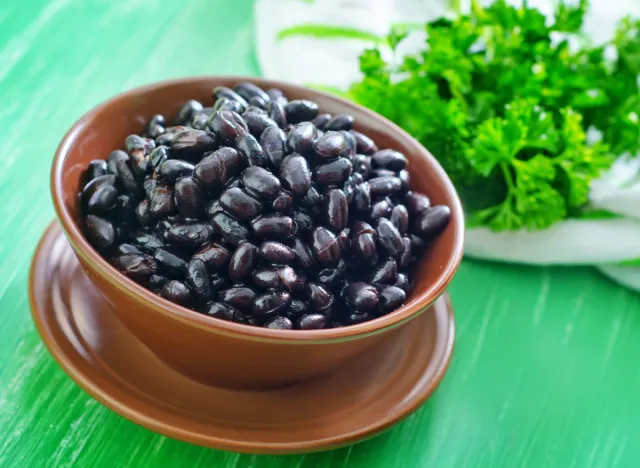
You go through pressure changes when you're on an airplane, and this can cause your intestines to expand, according to the Cleveland Clinic. You're more likely to experience bloating and excess gas when this happens.
One food that certainly won't help this cause is beans. Beans are not only high in fiber, which can cause bloating, but they also contain raffinose—a carbohydrate that your body may struggle to digest. Save yourself the stomach discomfort while you're stuck on your plane by avoiding beans before your flight.
Garlic
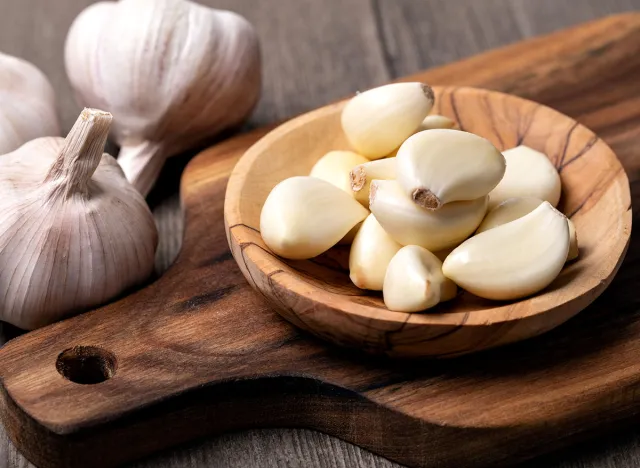
We've already discussed how flying can cause bloating and potential discomfort because of the changes in pressure, so chowing down on foods that bloat you can make the situation even worse.
A common bloating food is garlic, which contains high levels of a type of fiber called fructans. Many people have mild intolerances to fructans, which can cause your body to respond with bloating, stomach discomfort, and excess gas when you eat foods high in this fiber. Although many people have it, it's something that is poorly diagnosed and not widely known, so many people go on eating these high-fructan foods without realizing the reason behind their discomfort.
Aside from ruining your own experience, garlic before a flight might ruin your row mate's experience as well, since garlic breath is a real thing. Garlic is made up of many sulfur compounds that are activated when you chew it and can lead to a strong odor in your mouth, so save yourself and the people next to you some discomfort and avoid eating garlic before a flight.
Onions
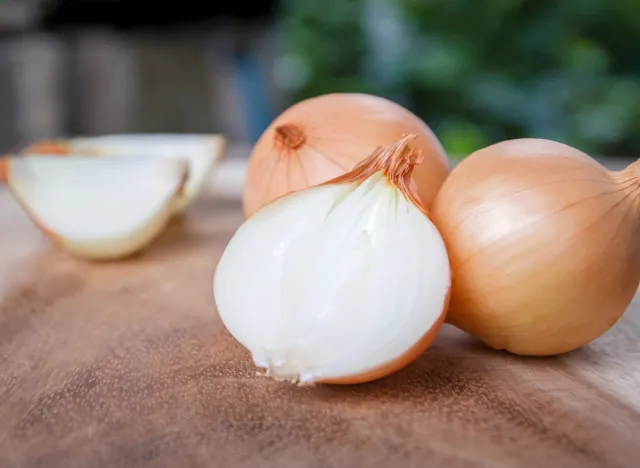
The reasons it's encouraged to avoid garlic before a flight are the same reasons we recommend skipping onions, too.
Both garlic and onions are high in fructans, which again are those fibers that some people have an unrecognized intolerance to. If you're scarfing down an onion-heavy dish before hopping on the plane, you may end up with some extra gas—which no one wants on their flight.
In the same way that garlic can give you undesirable breath, onions can do the same. This vegetable also contains many sulfur compounds, giving your breath an unfortunately strong onion odor.
Pears and apples
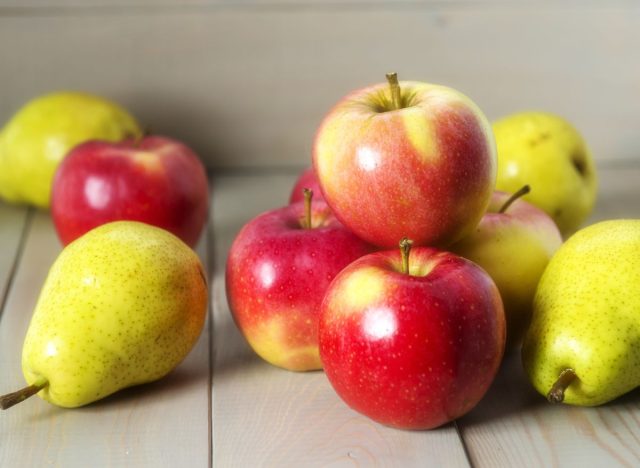
Apples and pears are super healthy snacks because of their fiber content, but when it comes to flying, you may want to choose something else.
Pears and apples are known to potentially cause abdominal bloating or discomfort after eating them because of their high levels of fructose—a naturally occurring sugar. We discussed earlier how people can have a tolerance to fructans and not be aware of it, and the same can be said for fructose. In many people, fructose can cause stomach pain and bloatedness.
Gum
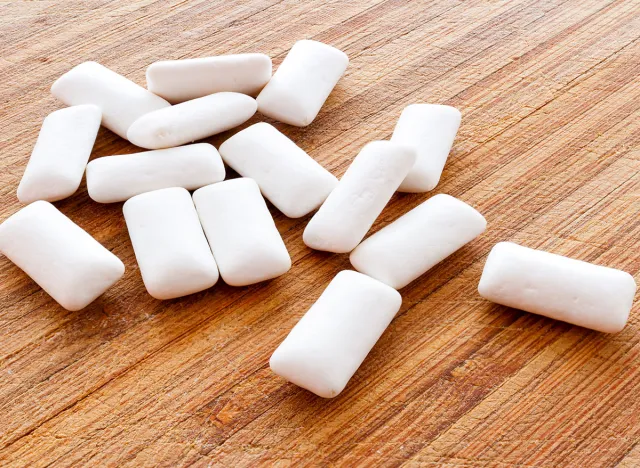
You've most likely had someone tell you to chew gum when you feel your ears start to pop on the flight, but this trick can also lead to some bloating and stomach discomfort while on the plane.
When you chew gum, you swallow a lot more air than usual, which can lead to bloating. Mayo Clinic (via Science Daily) suggests avoiding chewing gum and sucking on hard candies to lower your chances of bloating and stomach pain.
Coffee
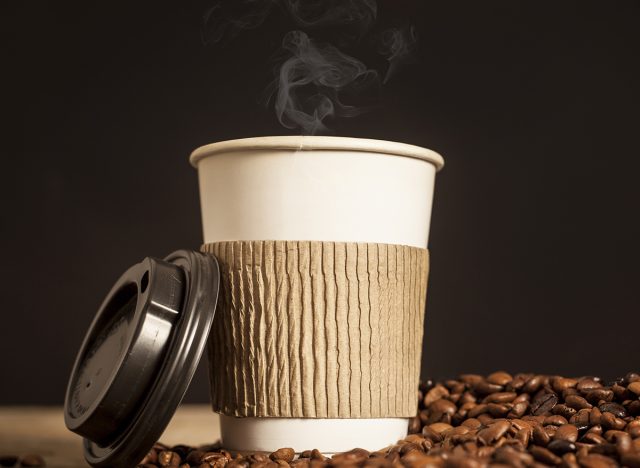
Before you down a cup or two of pre-flight coffee, you may want to think about a few potential side effects you can experience while on the plane.
For starters, anytime you drink a lot of liquid before boarding, you're going to increase your need to urinate while on the plane. This can be inconvenient for flyers.
Along with needing to urinate more, coffee is known to make you poop more, too. It stimulates your colon and causes more contractions, which will have you running to the restroom afterward. This is unfortunately inconvenient on the plane, especially if you find yourself in the window seat.
On top of that, coffee can also lead to symptoms of anxiety in people who are more sensitive to caffeine, which can cause jitteriness, nervousness, and an upset stomach. If you're a nervous flyer at all, drinking coffee may only make things worse.
Alcohol
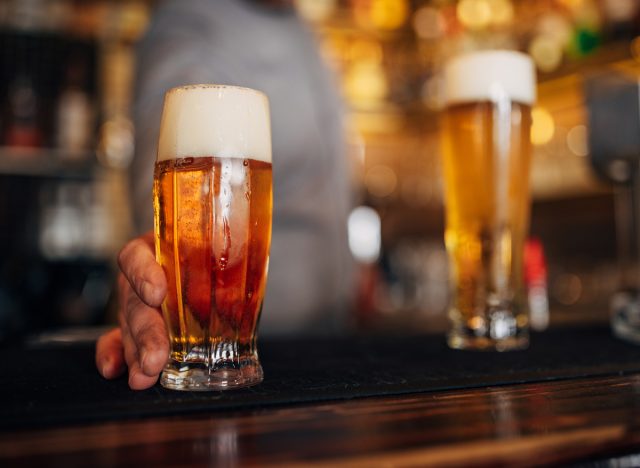
Posting up and drinking at the airport bar can be a comforting way to pass the time during a long layover, but be aware of the potential issues that can come from drinking alcohol before your flight.
Alcohol has diuretic effects, meaning it can make you urinate more frequently and dehydrate you. Because flights can already dehydrate you, adding alcohol to the experience will only make it worse.
Also, because alcohol can cause you to urinate more, you run the risk of the annoying inconvenience of having to take multiple trips to the bathroom when you're on the plane—something that neither you nor your row mates want.
There is also a link between drinking alcohol and feelings of anxiety and depression, mainly because of the dip in serotonin that it causes. Similar to coffee, be careful of how much you drink if you're a nervous or anxious flyer because both beverages can potentially make your symptoms worse.
- Source: Gastric Emptying of Low- and High-Caloric Liquid Meals Measured Using Ultrasonography in Healthy Volunteers
- Source: GERD diet: Foods to avoid to reduce acid reflux
- Source: Up in the Air: Evidence of Dehydration Risk and Long-Haul Flight on Athletic Performance
- Source: Sodium Intake and Hypertension
- Source: High altitude syndromes at intermediate altitudes: a pilot study in the Australian Alps
- Source: How Airplane Travel Affects Your Body
- Source: Raffinose Family Oligosaccharides: Friend or Foe for Human and Plant Health?
- Source: 15 Foods That Can Cause Bloating
- Source: Dietary fructose intolerance, fructan intolerance and FODMAPs
- Source: JAMA Network: Abdominal Bloating
- Source: Dietary fructose intolerance, fructan intolerance and FODMAPs
- Source: JAMA Network: Abdominal Bloating
- Source: Tips to reduce gas and flatulence
- Source: The Daily Grind: Why Coffee Makes You Poop
- Source: Effects of caffeine on anxiety and panic attacks in patients with panic disorder: A systematic review and meta-analysis
- Source: The Diuretic Action of Weak and Strong Alcoholic Beverages in Elderly Men: A Randomized Diet-Controlled Crossover Trial
- Source: Anxiety and Alcohol: Does Drinking Worsen Symptoms?

